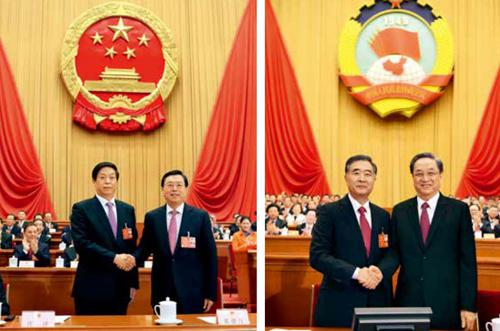Landmark Sessions Chart New Course
2018-06-14byChinaPictorial
by China Pictorial

China set new course for development during the recent annual “Two Sessions” where nearly 3,000 national legislators and over 2,000 top political advisers met in Beijing to discuss and decide on critical issues concerning the countrys future.
The first session of the 13th National Peoples Congress (NPC) opened on March 5 and lasted half a month, and the first session of the 13th National Committee of the Chinese Peoples Political Consultative Conference (CPPCC) convened on March 3 and concluded on March 15. The sessions were the first high-profile national political gatherings since the 19th National Congress of the Communist Party of China (CPC) last October and carried tremendous significance as China marches toward the goals set by the milestone Party congress—to basically realize socialist modernization by 2035 and build a great modern socialist country that is prosperous, strong, democratic, culturally advanced, harmonious and beautiful by the middle of the century.
According to this years government work report, China aims to grow its GDP by about 6.5 percent in 2018, which is consistent with last years target. Looking to greener and more sustainable engines such as consumption and services, the worlds second-largest economy is showing a clear intention to shift from high-speed growth to high-quality development. To achieve the growth target, China will also open its doors wider to foreign investors, further liberalize and facilitate trade and investment and better integrate with the international market.
To improve the peoples living standards, China will advance institutional social reforms this year, covering old-age pensions, public hospitals and healthcare. Greater efforts will be made to boost employment, raise incomes, relieve poverty and reduce disparities in urbanrural development.
China rolled out a massive institutional restructuring plan of the State Council, or Chinas cabinet, to cut bureaucracy. The national legislature approved a plan to cut 15 State Council entities at the ministerial or vice-ministerial levels and strengthen the cabinets roles in economic management, market supervision, social management, public services, and environmental protection. The institutional reform of the cabinet, the eighth since 1982, is expected to make the government better structured, more efficient and more service-oriented.

Unveiling specific goals and priorities for this years work as it conventionally has, China also elected new state leadership to work towards these ambitions. Xi Jinping was re-elected president of the Peoples Republic of China (PRC) unanimously by the NPC and he took the oath of allegiance to the Constitution in public. This was the first time a Chinese president took such an oath upon assuming office, only six days after the national legislature added oaths of allegiance into the newly amended fundamental law. Xi was also elected chairman of the Central Military Commission of the PRC. Following his lead, new heads of other state organs all took the oath of allegiance to the Constitution including the NPC, the State Council, the National Supervisory Commission, the Supreme Peoples Court and the Supreme Peoples Procuratorate. This move is part of the Chinese leaderships renewed commitment to the rule of law.
The National Supervisory Commission, endorsed by the amended Constitution, is a newly founded body intended to strengthen Chinas fight against corruption. The NPC passed the national supervision law to serve as a fundamental and guiding regulation to fight corruption and improve state supervision as part of an effort to guarantee reform of the supervisory system. A nationwide network of supervisory commissions has taken shape in China. Sharing offices and staff with the Party disciplinary inspectors, the supervisory commissions incorporated existing supervisory, corruption prevention and control agencies within governments and procuratorates. The commissions are expected to independently exercise supervisory power without interference from the government, social organizations or individuals.
Most importantly, the Constitution enshrines Xi Jinping Thought on Socialism with Chinese Characteristics for a New Era as the guiding principle for the countrys rise as the NPC adopted the first amendment to the fundamental law in 14 years. Deemed the latest achievement in adapting Marxism to the Chinese context, the Thought is a form of Marxism for contemporary China and the 21st century.
As the curtains closed on the Two Sessions, China set sail with its people primed to fight for a better life in the new era. The target of building a moderately prosperous society in all respects is only two years away. Precisely as President Xi said at the closing meeting of the NPC annual session, “The new era belongs to each and every one of us, and every one of us is part of this new era, witnessing, blazing new trails and building this new era.”